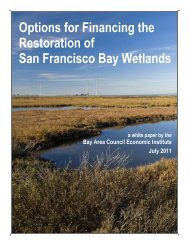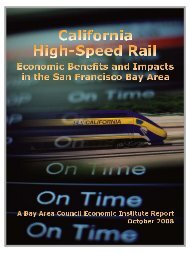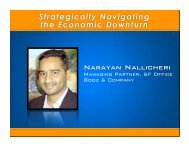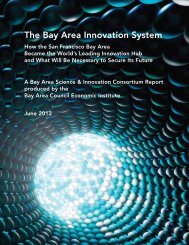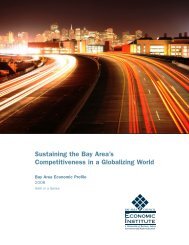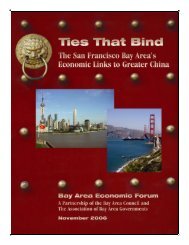PDF: 2962 pages, 5.2 MB - Bay Area Council Economic Institute
PDF: 2962 pages, 5.2 MB - Bay Area Council Economic Institute
PDF: 2962 pages, 5.2 MB - Bay Area Council Economic Institute
Create successful ePaper yourself
Turn your PDF publications into a flip-book with our unique Google optimized e-Paper software.
Global Reach<br />
Davis faculty and scholars have been deeply involved in work relating to India’s society and its<br />
economy. Some examples:<br />
• Davis has had, over the years, research collaborations with the Indian <strong>Institute</strong> of<br />
Science, National Center for Biological Science, University of Hyderabad, Center for<br />
Cellular and Molecular Biology, Osmania University, and the International Crops<br />
Research <strong>Institute</strong> for the Semi-Arid Tropics (ICRISAT). Plant pathology professor<br />
Douglas Cook’s lab has worked with Indian researchers on agricultural biotechnology<br />
research in support of rural development.<br />
• Dr. Satya Dandekar teaches microbiology and is conducting research into gastrointestinal<br />
tissue as an early target of the HIV virus. She has established an international collaborative<br />
research consortium in India with the Indian <strong>Institute</strong> of Medical Sciences at<br />
New Delhi and two Indian NGOs in the coastal region of Andhra Pradesh, where there<br />
is a large rural population and high incidences of HIV infection. As director of developmental<br />
core activities with the Northern California Center for AIDS research, she has<br />
trained Indian researchers.<br />
• Davis faculty members Ranjan Bose and Daniel Sperling prepared a 2001 report for<br />
Davis’ <strong>Institute</strong> of Transportation Studies, published by the Pew Center on Global<br />
Climate Change, on strategies to reduce greenhouse gas emissions in New Delhi through<br />
introduction of new technologies, increased mass transit, and a mix of alternative vehicles.<br />
• Delhi University graduate Smriti Srinivas, now an associate professor of anthropology at<br />
Davis, has written extensively on the transformation of spiritual memory and tradition,<br />
cultural identity, and physical movement in the city of Bangalore as it evolves into<br />
India’s high-tech city of the future.<br />
• Within the Davis School of Law, professor Anupam Chander has focused his published<br />
work on the trade impacts on India of intellectual property protection under the World<br />
Trade Organization structure. Law professor Madhavi Sunder has examined the issue of<br />
countries protecting their cultural industries as a form of intellectual property, as well as<br />
the topic of women’s rights within Muslim communities.<br />
UC San Francisco, with 19 graduate students from India and 106 visiting scholars, is<br />
involved in a wide range of medical research relating to India—in HIV/AIDS treatment,<br />
eye care, women’s health, and trauma care linked to earthquake and tsunami relief.<br />
The CARE-India program developed at UCSF, for example, is a set of interactive computer<br />
tools and self-testing programs that enable low-literacy international populations to determine<br />
whether they may have HIV/AIDS or other sexually-transmitted or drug-related illnesses and to<br />
obtain limited counseling through a network of interactive kiosks. This approach offers services<br />
at more locations closer to patients, while offering privacy, uniform levels of service, lower<br />
training costs and automated statistical reporting.<br />
In 1997, the Francis I. Proctor Foundation, which funds eye disease research laboratories and<br />
clinical facilities on the UCSF campus, expanded its programs for developing countries to include<br />
58



